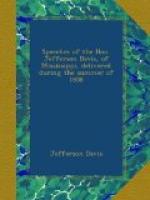Richly endowed as you are by nature in all which contributes to pleasure and to usefulness, the stranger cannot pass without paying a tribute to the much which your energy has achieved for yourselves. Where else will one find a more happy union of magnificence and comfort, where better arrangements to facilitate commerce? Where so much of industry, with so little noise and bustle? Where, in a phrase, so much effected in proportion to the means employed? We hear the puff of the engine, the roll of the wheel, the ring of the axe, and the saw, but the stormy, passionate exclamations so often mingled with the sounds, are no where heard. Yet, neither these nor other things which I have mentioned; attractive though they be, have been to me the chief charm which I have found among you. For above all these I place the gentle kindness, the cordial welcome, the hearty grasp, which made me feel truly and at once, though wandering far, that I was still at home.
My friends, I thank you for this additional manifestation of your good will.
Speech at the Portland Convention.
On Thursday, August 24th, 1858, when the Democratic Convention had nearly concluded its business, a committee was appointed to wait on Mr. Davis, and request him to gratify them by his presence in the Convention. He expressed his willingness to comply with the wishes of his countrymen, and accordingly repaired to the City Hall. On entering he was greeted in the most cordial and enthusiastic manner. After business was finished, he proceeded to the rostrum, and, addressing the Convention, said:
Friends, fellow-citizens, and brethren in Democracy, he thanked them for the honor conferred by their invitation to be present at their deliberations, and expressed the pleasure he felt in standing in the midst of the Democracy of Maine—amidst so many manifestations of the important and gratifying fact that the Democratic is, in truth, a national party. He did not fail to remember that the principles of the party declaring for the largest amount of personal liberty consistent with good government, and to the greatest possible extent of community and municipal independence, would render it in their view, as in his own, improper for




